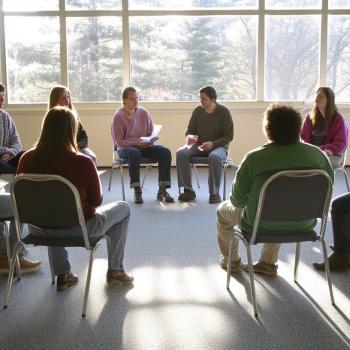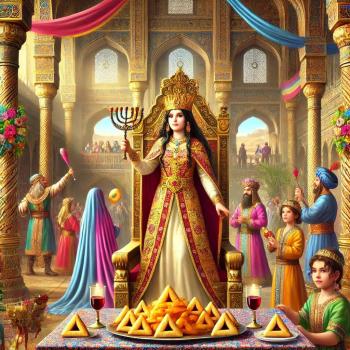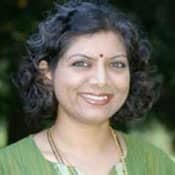I can occasionally be found on a street corner, waving a banner about ending war, or speaking on a panel for WISDOM about how ahimsa [non-violence in thought/word/deed], a concept intrinsic to Hinduism, inspires me to speak out for inclusion. But for the first time in my life I found myself at a wrestling match, which my middle school son was part of. I was sandwiched between two other mothers—one from my son's school, and the other from the hosting middle school. After exchanging pleasantries and establishing common ground—that none of us had watched wrestling before and we were there doing the obligatory parent thing—we touched on a topic that speaks to the essence of finding balance.
Girls were on the visiting middle school wrestling team, and the home team mother on my right raised the recent story of the Iowa high school wrestler who forfeited a match and possibly the state championship because of his refusal to wrestle a girl. I nodded, quite in agreement; the image of my son grappling with a young lady on the mat did not paint itself on the canvas of my mind so pleasantly. But then the mother on my left pointed out that girls should learn how to protect themselves, considering the high rate of violence against them, particularly date rape. (Refer to U.S. Department of Justice. 2007 National Crime Victimization Survey or www.rainn.org for more statistics, but sexual assault occurs about every two minutes.) And I thought of my teenage daughter, left to her own defenses, and the need for young women to know strategies for self-defense became palpably real. As the students wrestled on the mat, so did I with these opposing opinions in my mind.
I had already started the day on a seesaw. The news of the day was Representative Peter King's hearings on the radicalization of Muslims in America. I have compassion for my friends in the Muslim community and understand the need for religious minorities and majorities to develop programs to tear down barriers of ignorance, religious bigotry, and exclusivism: "my way is the only way" approach. I know the difficulties faced by my WISDOM sisters wearing hijab; I have been labeled "dothead." The Hindu American Foundation, an advocacy organization I am part of, has often spoken out against religious intolerance directed at Hindus, Sikhs, and Muslims alike, to protect religious liberty and with compassion toward all. My friend Najah and I develop our understanding of Hinduism and Islam based on our friendship and how our respective faiths empower us; our acceptance of one another is built on the awareness that we are part of one human community.
But there are those in the Hindu community who have had personal experience of religious fanaticism, especially radical Islam; they survived the partition of the South Asian subcontinent into Pakistan and India. One good friend in particular was a young child on a train to India from Pakistan at that time, not knowing if he would be another body or if he would survive the journey to begin life in India; unfortunately, holocaust is not confined to one demographic, one era. And there are Hindus in Pakistan and Bangladesh, both Muslim countries, trying to deal with the impact of being religious minorities, and statistics of how many Hindus are left in both countries are testament to these experiences.
All of us who are touched by the politics of India know how complicated religious violence can be; it is not a question of who is in the right and who is in the wrong. Veering to one side or listening to only one perspective can twist your perception so that you are not able to perceive another's pain. As my friend, Baptist global peace consultant, Rev. Dan Buttry said recently, "one side's 'terrorist' is another's 'freedom fighter.'"
In a New York Times essay, Akbar Ahmed, professor of Islamic studies at American University and author of Journey Into America: The Challenge of Islam, says:
. . . At the same time, Muslims must realize that to be truly accepted as "good" Americans, they need to more explicitly embrace American identity, culture and history—from political debates like Representative King's hearing to the ideals of this country's founders.
America, in turn, must realize its best aspirations by better understanding Islam. No appreciation of the founders is complete without an acknowledgment of their truly pluralist vision.





